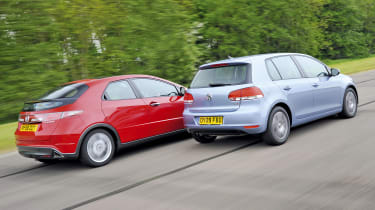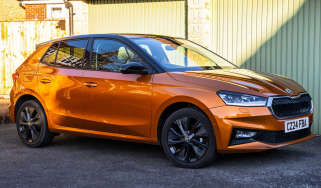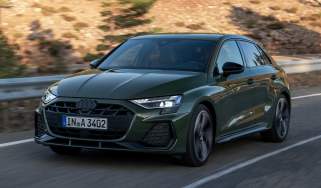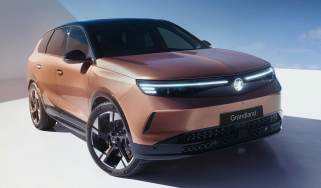Civic 1.8 i-VTEC vs Golf 1.4 TSI
They’re in same class, but these cars are polar opposites in execution
The turbocharged GTI steals the headlines for the VW Golf range – but you shouldn't overlook the smaller 1.4 TSI. It comes with 120bhp and should prove a perfect match for the refined Golf MkVI.
VW’s new hatchback seized the Honda Civic’s crown when we tried diesel versions of the current compact family car crop late last year. But this is the first time we’ve tested the 1.4-litre turbo version – and opposition doesn’t come any tougher than the naturally aspirated Civic 1.8.
Honda is committed to its VTEC variable valve timing-equipped petrol engines, and has always avoided turbo technology – even for its
Type R performance models. So will its tried and tested 1.8-litre i-VTEC have an answer to the smaller VW unit?
On paper, it looks good for the Civic, as its power output of 138bhp leaves the 120bhp Golf trailing. Delve a bit deeper, though, and some important differences emerge – because what the VW lacks in power, it makes up for with torque. Its 200Nm of thrust arrives at a lowly 1,500rpm, while the Honda has to make do with 174Nm at 4,300Nm.
Hit the road, and it’s clear that these two cars are like chalk and cheese. The Honda is quicker from a standing start, but you have to wring every last rpm out of the engine to get maximum performance, concentrating on the rev counter to time each gearchange to perfection.
Do this, and it will sprint from 0-60mph in 8.6 seconds, while the more relaxed Golf posts 9.1 seconds for the same test. However, if you’re already on the move, the Golf claws back the advantage. It matches the Honda from 30-70mph, and delivers more in-gear punch. A 50-70mph time of 10.7 seconds in sixth was 5.4 seconds faster than the highly strung Honda.
On the road, the Golf feels faster and more responsive than its rival, and it cruises more comfortably as well. Accelerate at motorway speeds in the Civic, and you need to change down to get the punch required. The Golf will happily deliver without the need for a downshift.
Family cars aren’t simply about performance, though, and the turbo model has other benefits, such as impressive CO2 emissions. The VW’s 144g/km output is 11g/km lower than the Honda’s, placing the German car in the 16 per cent tax band to its rival’s 19 per cent. This benefits company users with a lower tax liability and private motorists with a cheaper annual tax disc.
Judged on combined economy figures, the Golf should also have the edge – officially, it returns 45.6mpg to the Civic’s 42.2mpg. However, the tables were turned during our test, with the VW proving marginally thirstier.
There’s not much between the two in terms of price – our £16,520 SE-spec Golf undercuts the Civic ES by £80. But the VW falls behind again when you check out the standard equipment tally. It’s fitted with air-conditioning, cruise control and seven airbags, yet the Honda adds dual-zone climate control, a panoramic glass roof, front foglamps and bigger alloy wheels.
The Civic also trumps its rival for interior space, and is the more practical choice, thanks in part to the hugely versatile folding mechanism used for the rear seats.
In reality, these two cars have very different characters. The softer suspension of the Golf is more comfortable at low speeds and its engine is more relaxing on the motorway. The Honda feels livelier, with sharper steering responses and tight body control, although this is offset by its firm ride and rev-hungry engine. So while we can’t find much to separate the two cars financially, the Golf’s 1.4-litre TSI engine is better suited to the demands of a modern family hatchback – and that makes it 2-0 to the turbos.
Economy
There’s little to separate our rivals on price, so it all comes down to running costs. The VW’s combined economy of 45.6mpg pips the 42.2mpg Honda, but in our hands the Golf was second best at the pumps.
Environment
Car makers claim that small-capacity petrol turbo units are eco-friendlier than larger, normally aspirated powerplants – and the VW delivers on this. Emissions of 144g/km are 11g/km lower than the Honda’s, so buyers save on road tax and company car costs.



